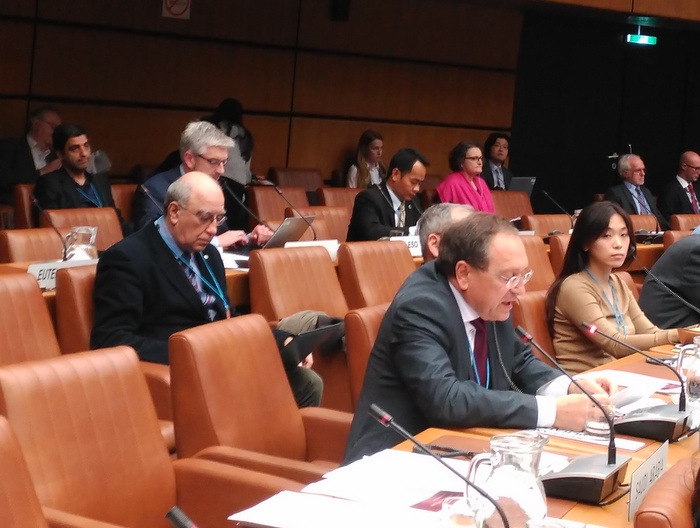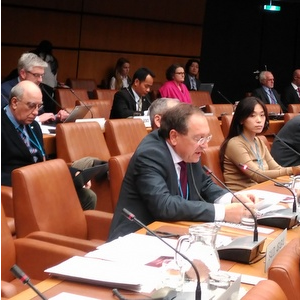Representatives of Samara University have partaken in the 55th session of Scientific and Technical Subcommittee of the UN Committee on Peaceful Uses of Outer Space.
The delegation of Samara National Research University named after academician S.P. Korolev has taken part in the 55th session of Scientific and Technical Subcommittee of the UN Committee on Outer Space. The discussion of the most relevant questions on space exploration took place in Vienna from January 29 to February 6, 2018.
The delegation of Samara University consisted of Professor
Igor Belokonov, Head of Inter-University Department of Space Research,
Anton Gulbis, Head of International Cooperation Department, and
Sergey Chernikov, Assistant Vice-rector for Education and International Affairs.

The speech delivered by Professor Igor Belokonov applied to the subject matter of the UN Programme on Space Applications. A significant part of his report was dedicated to summing up the Workshop “Human Capacity-Building in Space Science and Technology for Sustainable Social and Economic Development”, conducted at Samara University jointly with the United Nations Office for Outer Space Affairs (UNOOSA), from October 30 to November 2, 2017. The Workshop was co-sponsored by the European Space Agency (ESA), “Progress” Space Rocket Centre, and the Government of the Samara Region.
148 participants from 38 countries and international organizations, including ESA, International Consortium of Universities, which both develop space theme (UNISEC-Global), and UN-affiliated regional space centres have taken part in the Workshop.
In his speech, Igor Belokonov emphasised that human capacity-development in space science depends not only on the good will of the governments of developing countries, but also on the international support, including one through the UN. “The incorporation of space technologies increases the sustainability of social and economic development of the developing countries. Space technologies per se have a positive impact on the quality of human lives in countries with growing economies”, noted the Professor. To give an example, there is a project of micro- and nanosatellite network, capable of not only conducting online monitoring of disaster-stricken areas, but also gathering data, the analysis of which can help predict their appearance. Global navigation satellite systems can be used as a means of measuring.
Igor Belokonov paid special attention to the role of institutes of higher education and academic establishments in the working-out and realization of the strategies of human capacity-development in scientific-and-technical, engineering, and mathematical education. According to his words, the interest towards space technologies in developing countries should be intensified in a network of regional centres on human capacity-development in space science. Currently, there are six regional centres of the kind. However, it is expedient to establish new regional centres, for instance, in Russia, and to spread their influence across the Russian-speaking community.
The Professor has said that the participants of the Workshop in Samara have supported the initiative of the UNOOSA on the development of such network and expansion of its influence area. “We reckon that other participants, museums in particular, are to be joined to the UN-related regional educational centres in space science and technology. These structures play a key role in the realm of raising awareness on outer space affairs among different groups of population”, noted Igor Belokonov in his speech.
He focused great attention on the role of nanosatellite technologies in education. “Nanosatellites are relatively cheap, which leads to a rapid increase in the number of laboratories, creating satellites on the basis of CubeSat platform at the universities world-wide. Besides, students and young engineers are directly involved in creating space technology”, cited the Professor as an example. For the stabilization of this tendency, in the course of the Workshop, it was recommended to develop a ground-station network in an active way, to back up educational institutions in creating and launching CubeSat-based satellites, as well as to encourage young researchers, involved in these matters.
As an example of the practical result of the Workshop in Samara, the Professor mentioned forming an action team, consisting of the representatives of the universities of Italy, Tunisia, South Africa, and Samara University. It is going to take part in the conducting of high-tech space experiments within the framework of the competition, announced by Sierra Nevada Corporation under the aegis of UNOOSA during the flight of “Dream Chaser” experimental spacecraft in 2020.
Igor Belokonov has also noted that Samara University is ready to create on its base a regional scientific-and-educational training centre in space science and technology on real CubeSat-based satellite projects. It is noteworthy that staff members of the Department of Space Research have given an introductory course of lectures on nanosatellite technologies to specialists from Sri Lanka and Mexico. Sri Lankan engineers have taken a four-week-long training course at Samara University.
“Furthermore, in the course of discussions in Samara, the Workshop participants have suggested creating an expert group on the use of nanosatellites for human capacity-building in space science and technology. Such group could function within the limits of Scientific and Technical Subcommittee of the UN Committee on Outer Space, added the Professor. Samara University is ready to take part in the work of the expert group and assist it in solving organisational issues, connected with the formation of the subject matter of the expert group as well as its membership”.
For reference
In 2016, the delegation of Samara University, headed by the Rector Evgeniy Shakhmatov, participated for the first time in the work of Scientific and Technical Subcommittee of the UN Committee on Outer Space, where the Rector gave a talk. According to the results of the meetings, held during the functioning of the Subcommittee, treaties with UN-affiliated training centres in space science and technology, located in Nigeria and Mexico, were concluded. Agreements were also signed with the National Space Research and Development Agency (NASRDA, Nigeria) and Arthur C Clarke Institute for Modern Technologies (ACCIMT, Sri Lanka).
In 2017, Samara University jointly with the UNOOSA in collaboration with the Program Committee conducted the Workshop “Human Capacity-Building in Space Science and Technology for Sustainable Social and Economic Development”.
The UN deals with the space theme since 1957, the launching of the first Earth’s satellite. The UN Committee on Peaceful Uses of Outer Space (the UN Committee on Outer Space, in short) consists of the representatives of 77 countries; around 30 intergovernmental and non-governmental organizations have a status of permanent observers. At this Committee’s suggestion, the main international laws on the use of outer space are being created, some aspects of the work of national space agencies are being coordinated, and, in partnership with the governments of the UN Member States, a knowledge dissemination system in space science and technology is being set up.


